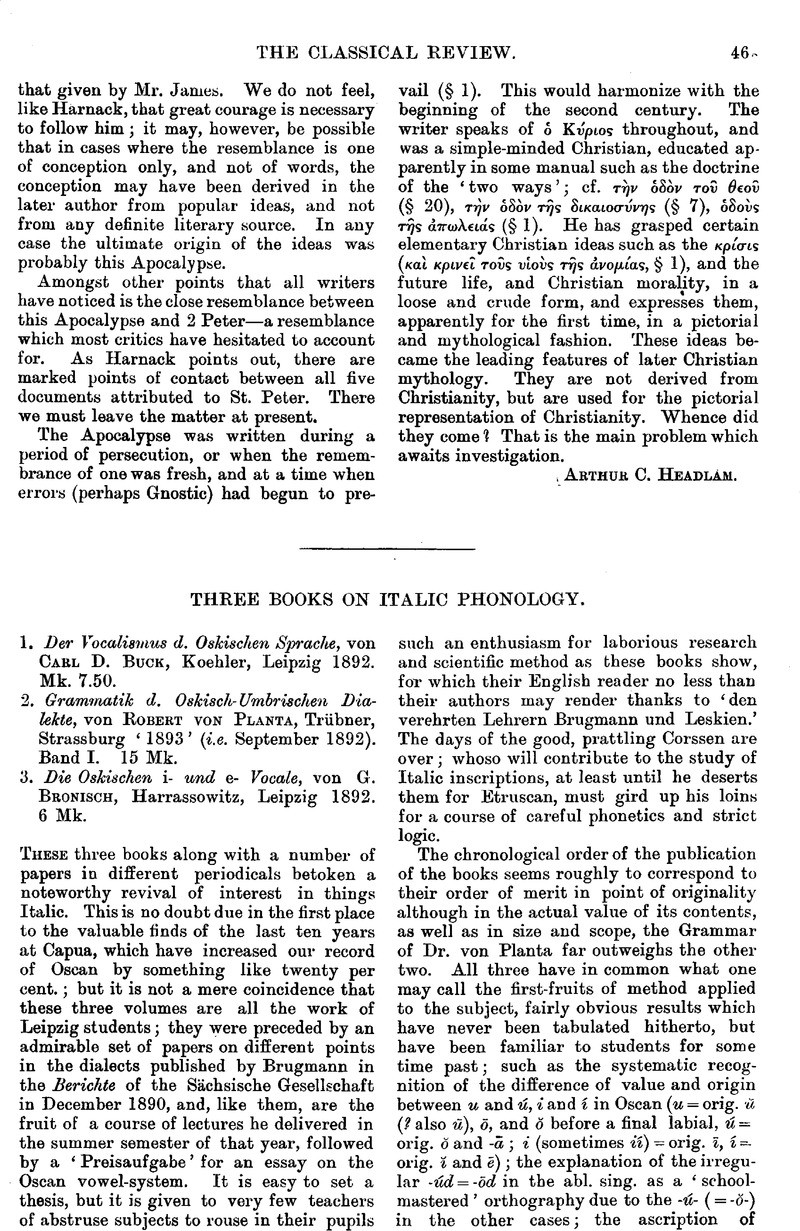No CrossRef data available.
Published online by Cambridge University Press: 27 October 2009

page 464 note 1 So Mr. W. M. Lindsay, bricflich, comparing O.Ir. maile.
page 464 note 2 There are no examples before -r, and therefore I am inclined still to believe with Fick (Wrtbch. I4, p. 34) that brateis = Lat. grati. The meaning is exactly right. And does not palumba: columba (qll-: gel- ?) suggest that velars remained in some Oscan dialect before l, and therefore probably before l or r ?
page 464 note 3 Von P. explains the t of the name in Lat. as due to a popular etymology from ater, which I scarcely think is likely; it is only possible because the town was a Roman colony; the recorded name of every Italian town is that spoken on the spot.
page 464 note 4 Camb. Philol. Soc. Trans. iii. part 3.
page 464 note 5 úpsim on the wings of an allegorical picture of night, I believe, means ‘let me cover you.’
page 465 note 1 I find however that it is repeated from Brugmann (Grundr. i. p. 55), where it looks like a remnant of Corssen-tradition.
page 465 note 2 This is done in, I think, a solitary instance, p. 170–3.
page 466 note 1 Surely it is time this misleading term was abandoned. It was first used by Niebuhr to denote Marsi + Peligni + Marrucini + Vestini. Mommsen (U.D. p. 329) makes it = Marsi + Marrucini + Sabini + Picentes. In neither case does it denote any linguistic unit: see Idg. Forsch. i. p. 163 footnote 3, and thereby correct von Planta p. 335, who does not recognize -qu- as Sabine.
page 466 note 2 Whoever demurs to this description should consult Deecke himself (Rhein. Mus. xli. p. 191 ff.).
page 466 note 3 The u in this word need not represent ![]() = Ital.
= Ital. ![]() : if it were so, von P.'s objection that
: if it were so, von P.'s objection that ![]() is regularly represented by o in the Umbro-Lat. αβ would have considerable weight. But the stems
is regularly represented by o in the Umbro-Lat. αβ would have considerable weight. But the stems ![]() were part of the paradigm (Brugmann, Gd. ii. 132) as well as the less regular
were part of the paradigm (Brugmann, Gd. ii. 132) as well as the less regular ![]() , and the contraction of either of these may have become -u - separately in Latin and Umbrian.
, and the contraction of either of these may have become -u - separately in Latin and Umbrian.
page 466 note 4 As to erus, which is so written even in the later tables, and must therefore end in more than a single -s, it is perhaps worth asking whether it may not stand for *erufs=Gr. ἔρευθος, in the sense of ‘blood.’ It is a part of animal sacrifices specially offered. If so, the - is part of the (disyllabic) root. Compare Ved. aru-sa- aru-na- ‘ red’ and Pedersen, Idg. Forsch- ii. p. 325, a most important contribution to the ‘root-theory.’
page 467 note 1 As to this von Planta remarks (p. 37); ‘ Dieses Material ist noch nicht methodisch gesammelt und verarbeitet, ein consequentes Herbeiziehen desselben daher nicht thunlich.’
page 467 note 2 This I hope to publish very shortly after my edition of the Dialects, which should appear this winter.
page 468 note 1 The only possible alternative would be to say they were unused to writing double letters, and thought p a less inaccurate representation of -bb- than b would be. This view von P. does not advance, and meddis, mallom on the same insc. as hipid make it most improbable. On my view the -dd- (not -t-) in meddis is due to its being felt to be a compound. The competition of t and -dd- produced the spelling metd- in one insc.
page 468 note 2 Prof. Buck's difficulty (p. 21) is purely verbal. Instead of speaking of the ‘ assimilation of g to t in pic-tus, etc.,’ we should describe it as ‘the retention of the voiceless or whispered sound of the media before a tenuis after it had become voiced between vowels.’ And after all is Prof. Buck quite sure about his ‘ strengdurchgeführte Lautzgezetz’ ? What of Skr. buddha- and the like ?
page 468 note 3 The coin is in the British Museum, hopelessly defaced.
page 469 note 1 Possibly = ![]() , from the root of frěquens, farcio, φρσσω (frēq.). For the custom that girls should offer up their toys on marriage, cf. Anthol. Pal. Graec. vi. 280, besides of course Pers. ii. 70 and Schol. If it be not too frivolous, compare the doll episode in The Master-builder.
, from the root of frěquens, farcio, φρσσω (frēq.). For the custom that girls should offer up their toys on marriage, cf. Anthol. Pal. Graec. vi. 280, besides of course Pers. ii. 70 and Schol. If it be not too frivolous, compare the doll episode in The Master-builder.
page 469 note 2 This was quoted bv Brugmann Ber. Sächs. Gesellsch. Wissens. 1890, p. 223.